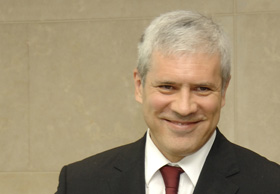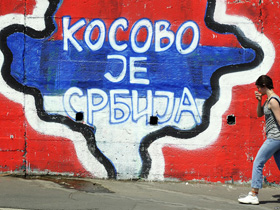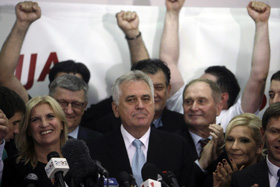A draw in favour of Nikolić
In
Login if you are already registered
(no votes) |
(0 votes) |
Doctor of History, Director of the Center for the Study of the Contemporary Balkan crisis of the RAS Institute of Slavic Studies, Academician of the Serbian Academy of Arts and Sciences
On the Serbian political scene there have been changes: the two political parties and even the two leaders have become major players, however the votes were equally divided in fact. Waiting for a change in Serbia? Apparently, Boris Tadic will peacefully change seats from the presidential chair to the Prime Minister chair but the country's course will remain the same. Serbia will continue talks on European integration and, therefore, will be forced to make concessions on many issues of domestic and foreign policy. Relations with Russia remain at the same level, but pressure from the West on their adjustment will increase.
On the Serbian political scene there have been changes: the two political parties and even the two leaders have become major players, however the votes were equally divided in fact. Waiting for a change in Serbia? Apparently, Boris Tadic will peacefully change seats from the presidential chair to the Prime Minister chair but the country's course will remain the same. Serbia will continue talks on European integration and, therefore, will be forced to make concessions on many issues of domestic and foreign policy. Relations with Russia remain at the same level, but pressure from the West on their adjustment will increase.
Election Results
On May 6, 2012 Serbia voted: the people elected deputies to the Assembly and local authorities, as well as the president. 13 parties, movements and associations fought for the 250 seats in the parliament of the 9th convocation. 12 candidates aspired to the presidential office. 6,770,013 people in this country and registered abroad were listed as voters.
The new president has inherited an empty treasury chest, huge debts, confusion in health and education, neglected villages destroyed by the army, two million unemployed, and a corrupt administration.
The leader of the parliamentary elections was the Serbian Progressive Party (SPP), led by Tomislav Nikolic. Together with three other small parties, it gained 24.1% of votes (73 mandates). Coming second was the now former ruling Democratic Party (DP) with 22.4% of the vote (68 seats). In third place came the Socialists (SPS) - 14.4% (44 mandates). The once-powerful Democratic Party of Serbia (DPS) Vojislav Kostunica won 6.9% of the votes (21 mandates), the Liberals - 6.6% (20 seats). The Party of Regions will take 16 seats in the Assembly. To the surprise of many experts the Serbian Radical Party did not get to enter the Assembly, whose leader Vojislav Seselj, was in prison of Hague Tribunal for nine years. In the elections of 2008 the party won 77 seats in parliament and was the main opposition party in the Assembly.
The new parliament will be finalized by June 9, and the government must be formed no later than September 5.
In the second round of Serbian presidential elections in the list there were two candidates who scored the greatest number of votes in the first round - Boris Tadic, Serbian president in the last two terms (25.31%), and the leader of the Progressive Party Tomislav Nikolic (25.05%). As you can see, the difference between them was only 0.26%. In the second round there was a slight advantage on the side of Nikolic. For him voted 49.54%, for Tadic - 47.31%.
Thus, in the political scene in Serbia, two political parties and the two leaders have become major players, and the votes were equally divided. Their parties got about a third of the seats in the Assembly, and the gap between them was only five seats. However, assessing the results of the election, it must be said that a vote for Nikolic was primarily a vote against Tadic, against his concessions to the West on Kosovo, NATO, against the disastrous state of the economy. The new president has inherited an empty treasury chest, huge debts, confusion in health and education, neglected villages destroyed by the army, two million unemployed, and a corrupt administration. It is also important to note that in the new parliament there are virtually no opposition supporters against his Kostunica convictions (no NATO, no EU, no independence for Kosovo) there are very few seats that are likely to seriously affect the decision-making.
The Head of the EU Delegation in the elections in Serbia, Vincent Dezher noted with satisfaction that all the pro-European parties entered the Assembly, and accordingly, they would have a majority in parliament, which is essential for a democratic decision-making process.
Can Nikolic fulfill the expectations of the voters?
By punishing sanctions, dropping bombs, the West has taught the Serbs that solving the current issues cannot be done without pleasing the US.A and the EU, with which an agreement to start negotiations on membership has already been reached.
Nikolic has been in politics since 1992; three times he was nominated for the presidency from the Serbian Radical Party. In 2008 he broke from the Radicals, but remained in the Assembly occupying the seats of parliamentary radicals, formed a new party, called it progressive, having moved from being a nationalist to a conservative.
In the Assembly Nikolic did not position his party as the opposition and enjoyed the support of Tadic, he was not caught up in the confrontation between the authorities on key issues of domestic and foreign policy. According to the laws of the genre in the election campaign Nikolic became the "opposition" candidate that won him support among some voters.
Now, as president, Nikolic will have to respond with concrete actions to the important issues: whether to recognize Kosovo's independence, whether to join the EU in exchange for losing part of its land, whether to reform the army and become a member of NATO. It should be emphasized that the Serbian Progressive Party, despite the fact that it has been founded in late 2008, has a clearly developed program. The Nikolic campaign was built only to criticize the existing regime and its domestic politics. SPP calls for respect for the Constitution, safeguard the rights of national minorities, promises to fight corruption and crime, promote economic prosperity in the state of social justice.
In an interview with the Izvestia newspaper Nikolic said that "we would like to be a member of the EU, but we are not entering into NATO and we are not giving up Kosovo”. However, in an interview with “Frankfurter Allgemeine Zeitung” the future president admitted that in campaign policies things are often said that are unable to be accomplished, and that he understood that Kosovo was lost for Serbia.
If Nikolic is a real politician than he must understand that Serbia has long ago given up being independent, just as all the Balkan states. By punishing sanctions, dropping bombs, the West has taught the Serbs that solving the current issues cannot be done without pleasing the US.A and the EU, with which an agreement to start negotiations on membership has already been reached. The previous government did not say "no" to Brussels. Will the new one do it? Most likely not. Recently, "Serbia must recognize Kosovo if it wants to join the EU" has already become the main leitmotif of all the diplomatic talks with the leadership of Serbia. On the day of his first victory, Nikolic told reporters that we would not curl up in a European way. So it is useless to expect major changes in foreign policy from the new president. This was also confirmed by our thinking about the possible option of forming the government.
How to form a government in the absence of a majority?
The formation of a government is the number one challenge after an election. According to the Constitution, 90 days are allowed after the final approval of the Assembly. The candidacy of the Prime Minister is proposed to the parliament by the president. It is recognized that the candidate must have the support of a simple majority in the Assembly (126 votes). The premiership is also an extremely important attribute of the country's political life, because Serbia is not presidential, but a parliamentary republic, so the prime minister has very broad powers.
Since no party won the majority, there will have to be negotiation. With 73 progressives in the parliament, it is required to find additional 53 supporters from the other parties. Tadic's Democrats are lacking 58 allies. Tadic was the first one to form a majority, agreeing with the support of the socialists (44 seats) and several smaller parties. The DP has already put forward the Tadic case as a candidate for prime minister. Most political experts predict exactly such a scenario, called a coalition when relations between the president and the government are represented by opposition political forces.
Aleksander Vucic, who led the CSE after Nikolic, said that the formation of a government without the Progressives was not possible. But then he must either support Tadic, or look for support among the remaining members of parliament, as even supporters of Kostunica (21 votes) will not save the situation. Yes, and it will be difficult to negotiate because Kostunica is known for being uncompromising and will insist on the adoption of the postulates of his party: European integration cannot be above the interests of Serbia, no to NATO membership, non-recognition of Kosovo's independence.
One of the most common combinations is to combine the forces of Democrats and progressives which would serve the interests of the West. Nikolic stressed that the coalition with the Democrats was only possible if Tadic would agree on decisive and effective reforms in the country. This option is quite possible, since there are not large differences in the programs of the two parties. Nikolic said that the program for the progressives was not defined yet, and therefore could be adjusted. The only difficulty with this approach could be a disagreement with Vucic, but then the coalition option remains, which is quite comfortable, for Tadic and Nikolic. They confirmed on May 28th that they would work together to resolve all important issues for the country. Nikolic said that he would not hesitate to give the right to form a government which would have the support of 126 deputies.
Will the relationship with Russia be a priority for the new president?
Nikolic confirms the importance of cooperation with Russia and Putin, but for him it is no less significant than the support of the European states, the United States and NATO.
The new president has already decided that the foreign policy would be a priority. He outlined this on his first visit to Brussels, next he flew to Washington and Moscow, thus emphasizing the proposed policy. On May 26th Nikolic was in Moscow at the "Edinaya Rossiya" Congress, but it was an unofficial visit as the leader of the Progressive Party. Nikolic confirms the importance of cooperation with Russia and Putin, but for him it is no less significant than the support of the European states, the United States and NATO. So, it is obvious that Nikolic will continue the foreign policy of his predecessor, balancing between the EU, USA. and Russia. Russia thus has serious plans to continue supporting Serbia on Kosovo in the Security Council, and enhancing economic cooperation. In the near future, Moscow will give Serbia the second tranche in the amount of $ 800 million for infrastructure projects. Moscow expects the new government to be more favorable to their economic projects in Serbia.
Nikolic’s promises to build a priority relationship with Russia may encounter vigorous resistance from the West and the emergence of new threats and ultimatums on his part. Europe and the US.A are annoyed that Russia opposes the recognition of Kosovo's independence and is strengthening its position in the Balkans, creating an Emergency Center in Nis. Dissatisfaction was also caused by the signing of an agreement on the "South Stream" gas pipeline which must pass through the Serbia’s land.
Therefore, do not expect serious changes in domestic and foreign policy of Serbia after the power change. If Tadic takes the première’s seat the course of the country will remain the same. Serbia will continue talks on European integration and, therefore, will be forced to make concessions on many issues of domestic and foreign policy. Relations with Russia will remain at the same level, but pressure from the West about their adjustment will increase.
(no votes) |
(0 votes) |







